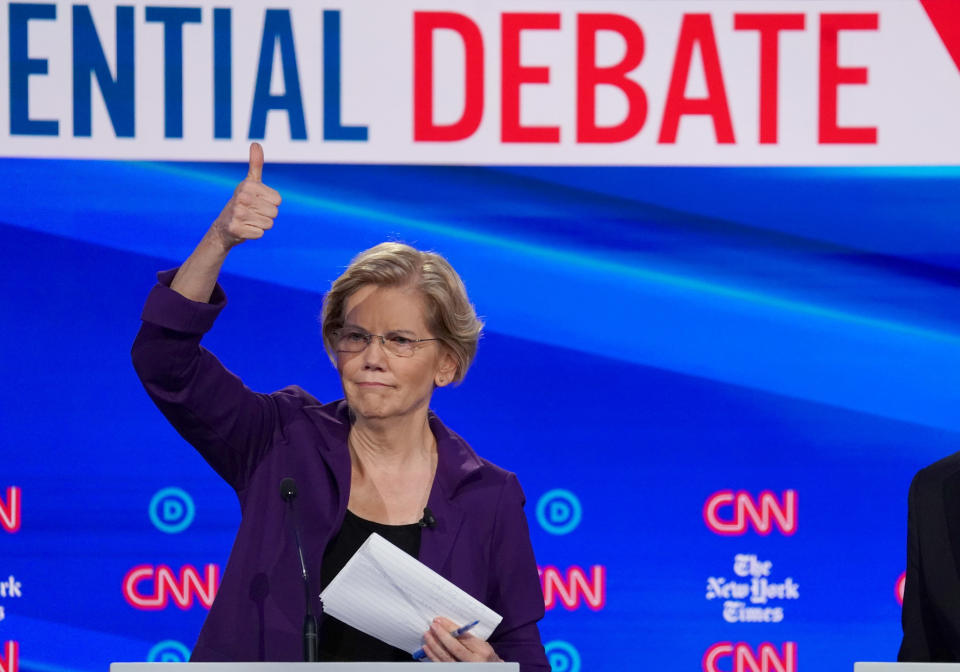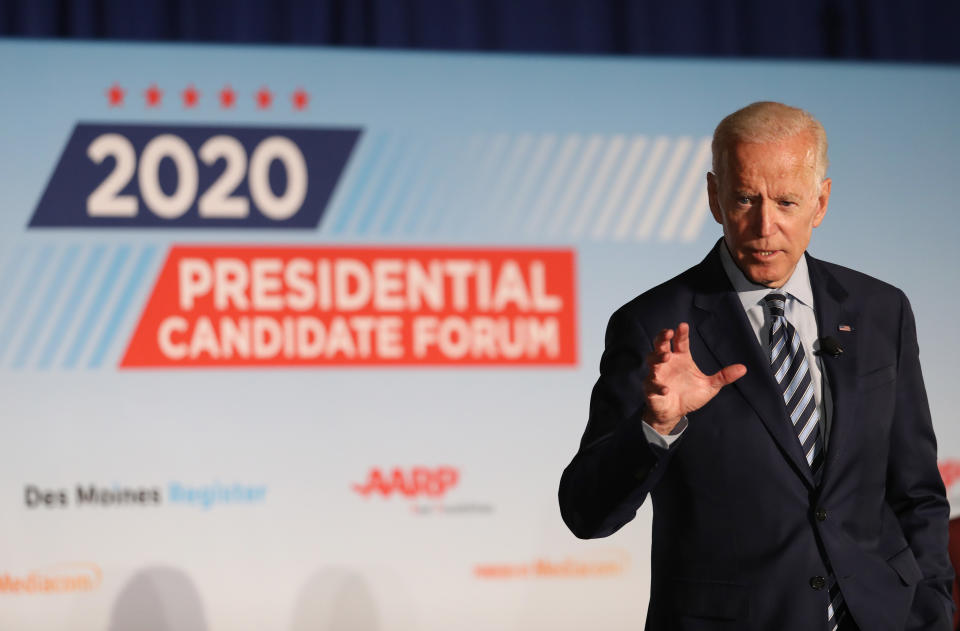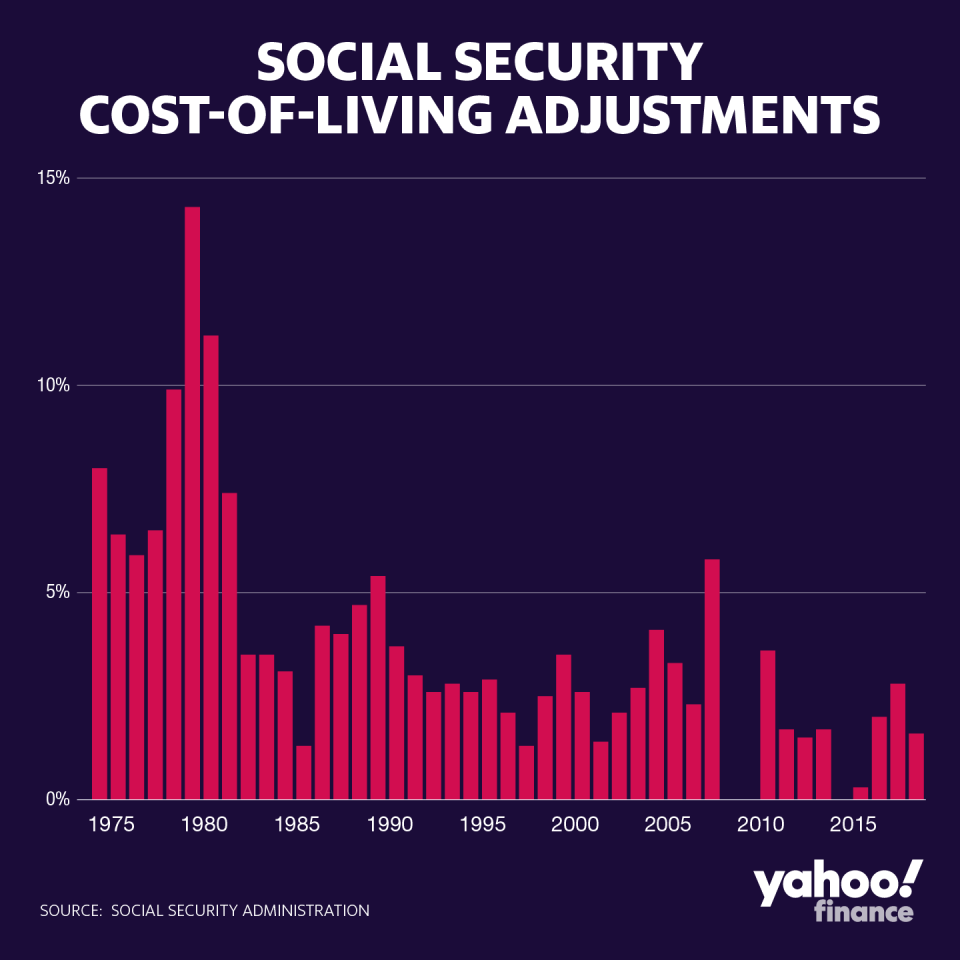How Bernie Sanders – and Trump – are making Social Security a big issue for 2020
Campaign volunteers, political activists, and organizers descend on Iowa every 4 years to knock on doors for their candidate. This time around, the army of 20-somethings stumping for Vermont Sen. Bernie Sanders are getting asked about an issue that’s a bit outside their current life experience: Social Security.
That’s where Alex Lawson comes in.
“Social Security comes up on the doors all the time,” said Lawson, a Sanders supporter who is also the executive director of Social Security Works, a Democratic-affiliated group that pushes for an increase in Social Security benefits.
Lawson has traveled to Iowa multiple times to help his candidate out. In an interview with Yahoo Finance, he noted that canvassers “were not feeling as equipped with the Social Security story as, say, Medicare for All.” Lawson has held impromptu seminars for organizers: he is there to “tell them how it plays together” he says.
The importance of Social Security has broken into the open in recent days as Vice President Joe Biden and Sanders trade increasingly harsh attacks over Biden’s record on the issue.

The Sanders campaign has circulated older comments from Biden to argue that a President Biden might put retirement security at risk. Bill Neidhardt, the Iowa Deputy State Director for Senator Sanders, says that Iowans are “realizing that someone running for president has a decades-long history of working with the GOP to try to cut Social Security.”
Biden’s campaign has responded by calling comments like that dishonest. Many of the clips that the Sanders campaign has circulated “didn’t tell the full story,” according to Politifact.com, and Biden has defended his past record of working with Republicans on budget issues. The former Vice President has been consistent throughout the campaign in saying he would not cut Social Security as president. “No. No. No. No,” he said on Jan. 22 in an interview with MSNBC when asked if he would consider Social Security cuts.
The issue will likely get even more fuel after President Trump, in an interview with CNBC in Davos, Switzerland this week, seemed to suggest a willingness to look at reforming entitlement spending (political code for cuts). “At the right time, we will take a look at that,” Trump said. He later tweeted, without evidence, that Democrats would destroy Social Security, but he would “save” it.
Democrats are going to destroy your Social Security. I have totally left it alone, as promised, and will save it!
— Donald J. Trump (@realDonaldTrump) January 23, 2020
According to a search of trumptwitterarchive.com, Thursday’s tweet was only the third time Trump has used the term “Social Security” in a tweet since becoming president. His last mention of the program, before Thursday, had been in 2018.
Greg Valliere, chief U.S. policy strategist at AGF Investments and a close observer of financial issues in Washington D.C., wrote that Trump's move to bring up Social Security was a “late Christmas present” for Democrats.
Plenty of campaigns are involved
Seven debates have passed with a grand total of zero questions about Social Security or retirement issues but the campaigns on the ground have been focused on the issue for months.

During a debate in October, Sen. Elizabeth Warren brought it up in the middle of a conversation about automation. “I've put forward a plan to extend the solvency of Social Security by decades and add $200 to the payment of every person who receives Social Security right now,” she said.
The Warren campaign has also run television ads in Iowa to tout her plan. According to data from Advertising Analytics, a firm that tracks ad spending, Warren’s ad ran 645 times in Iowa last November.
New :30s ad up from @ewarren in Iowa this morning - laying out her plan for a $200/month increase in social security. #Election2020 pic.twitter.com/xusFhPt1b4
— Advertising Analytics (@Ad_Analytics) November 18, 2019
Andrew Yang is another candidate who has made a direct televised pitch on Social Security linking the program with his campaign’s signature plan for a Freedom Dividend. The ad aired over 1,500 times in both Iowa and New Hampshire, according to Advertising Analytics.
S.Y. Lee, Yang’s national press secretary, linked the two proposals even more closely saying that the ad shows how the Freedom Dividend “represents the largest expansion of Social Security in history.”
Last summer, the AARP held forums across Iowa featuring Democratic candidates. The first question in a series of web videos alongside the appearance was about Social Security and Medicare. Every candidate, from Joe Biden to Pete Buttigieg to Amy Klobuchar answered.
"We should be increasing, not decreasing, Social Security," Biden said at the forum.

A debate over how much, not whether, to increase benefits
While the debate in Washington has often included proposals that put benefit cuts on the table, the debate within the Democratic field has been almost exclusively around how much to increase benefits.
Warren would raise Social Security benefits by $200 per month “for every current and future Social Security beneficiary.” Sanders also has a plan to increase benefits across the board, including by $1,300 a year for low-income seniors.
In his retirement plan, Pete Buttigieg has proposed some benefit increases, including for unpaid caregivers. Biden, likewise, suggests targeted benefit increases for the the oldest Americans and a minimum benefit for workers who spent 30 years in the workforce paying into the system.
Sen. Amy Klobuchar’s plan includes increases for widows and people who took time out of the paid workforce.
The candidates would pay for the increased benefits by lifting all or part of the payroll tax cap, which limits the amount of earned income subject to Social Security taxes. The cap currently stands at $132,900 a year. Some would also look at new taxes on capital gains.
A New York Times/Siena College poll from last fall found that 89% of likely Democratic caucus participants expressed support for increasing Social Security benefits by $200 per month. Among those who identified Bernie Sanders as their top choice, the figure rose to a whopping 98%.
Across the country, a 2019 Pew poll found that 74% of Americans say Social Security benefits should not be reduced in any way. In the same poll, 83% expressed doubt that Social Security will, in fact, provide benefits at current levels when they retire.
Different states with different relations to Social Security
Iowa is the epicenter of all things election at the moment and the issue is likely to continue to play throughout the primary season. Lawson notes that “Iowa is extremely important because Social Security for rural folks is incredibly important.”
It’s also a key issue in New Hampshire. According to data from the Population Reference Bureau, New Hampshire is the ninth oldest state in the U.S. (measured as the percentage of the population over age 65). South Carolina is close behind with 17.7% of the Palmetto state’s population of retirement age.

“It's really a critical issue in all of the early states,” says Lawson.
California has the largest total number of retirees in the nation and votes as a part of “Super Tuesday” on March 3. Florida, with its giant and highly organized retirement community, votes just a few weeks later.
Trump’s comments in Davos may also set up a general election contrast on the ever-important issue of entitlement spending. Immediately after the interview, the Expand Social Security caucus, a group co-founded by Warren and Sanders, released a series of statements.
“President Trump’s comments today highlight what we already knew to be true: The GOP gave huge tax breaks to the wealthiest, and is now coming after Social Security and Medicare to pay for them,” said House co-chair Rep. Terri Sewell.
In his tweet, Trump referenced his 2016 campaign promise to not touch Social Security: “I have totally left it alone, as promised.”
Lawson has also been visiting senior centers as part of his work in Iowa. He says he calls the voters he encounters “always voters” because – you guessed it – it’s absolutely true that they always vote.
Ben Werschkul is a producer for Yahoo Finance in Washington, DC.
Read more:
Congress might finally address the 'imminent danger' facing Social Security
How to save Social Security? Some candidates are looking at capital gains
Pete Buttigieg has a new plan to shake up the retirement system
Read the latest financial and business news from Yahoo Finance
Follow Yahoo Finance on Twitter, Facebook, Instagram, Flipboard, LinkedIn, YouTube, and reddit.
